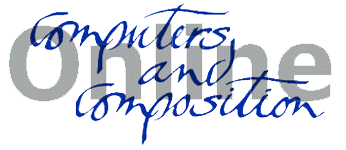Fall 2015 - Spring 2016
With this issue of Computers and Composition Online, we mark over a dozen years of publishing digital scholarship by new and established voices in the field of computers and writing. Our current issue represents a diverse array of pieces devoted to the relationship among technology, curricular innovation, theory-building, popular culture, language acquisition, and community activism. Given my own research interests in gender and technology, I am especially delighted to feature a number of pieces in our Theory into Practice and Professional Development Sections that attend to this particular relationship as well, noting the importance of understanding the material and cultural conditions that impact women's and girl's access to technology. As you peruse our journal’s sections, however, I hope you’ll find, as I do, each piece to be a compelling contribution to the discipline.
Our Theory into Practice section begins with Aaron Beveridge's (University of Florida) "Looking in the Dustbin: Data Janitorial Work, Statistical Reasoning, and Information Rhetorics." Beveridge stresses the inherently rhetorical nature of data visualization, calling for more emphasis on "data literacy" as a critical act of reading, writing and research. Relying on the tagcloud to "provide a pragmatic introduction to the inventive aspects of statistical reasoning and its relevance," Beveridge emphasizes more attention to data-analytical frameworks in both undergraduate and graduate curricula. Elizabeth Chamberlain's, Rachel Gramer's, and Megan Faver Hartline's (University of Louisville) "Mess, Not Mastery: Encouraging Digital Design Dispositions in Girls" features the fabulous work at Louisville on the Digital Media Academy, a free-two week digital media summer camp for girls. The authors feature the various narratives, design processes, and participant products to foreground the successes and the challenges of fostering girls' increase in "comfort and confidence as capable, active creators of digital texts in a community of other girls making design contributions." Similarly, in "High School Girls Soliciting Feedback: Lessons from a University-to-High School OWL," Dawn M. Formo (California State University, San Marcos) and Kimberly Robinson Neary, (Los Angeles City College) report the result of a funded longitudinal research project in which CSU, San Marcos, partnered with five local high schools to provide OWL services. Based on that project, the authors foreground interviews with a number of female student who reported various limitations of the interface based on their expectations "of this digital response site and its ability to strengthen their agency in soliciting and negotiating feedback." And finally, in the spirit of the current Star Wars craze at this writing in December 2015, I’m delighted to include Paul Muhlhauser's, Daniel Schafer's (both McDaniel College), and Cate Blouke's (Wofford College) "May the #Kairos Be with You: Accessibility, Authdi, Veils, and Star Wars." As the title implies, the authors "explore the ways digital technologies are changing how we view kairos and its rhetorical importance using Star Wars and the Force as an extended metaphor."
Our Virtual Classroom Section first features Katherine Hanzalik's (Clemson University) "Electrate Dream Interpretation: A First-Year Composition Post-Critical Project on the Dreamlike World of Video Games." Hanzalik shares the results of her innovative theory-driven, teacher-research based study on gaming literacies in the classroom, questioning "how do technologies and individualities work dialectically to form identities in the composition classroom?" Hanzalik's webtext design strategically foregrounds the plethora of identity play spaces available in an intentionally surreal blend of play, dream, and rigorous research. The relationship between technology and identity also plays a role in Erin Laverick's (University of Findlay) "Code-meshing within a Multimodal Framework." Laverick relies on theorists such as Suresh Canagarajah to guide her introduction of code-meshing assignments with English language learners in ways that triangulated home languages with English and images to further the opportunity for L2 writers to be rhetorically effective as 21st-century communicators. Mark Sutton's (Kean University) "Creating Multimedia Data Sources as Part of Teaching Primary Research" engages in similar teacher research as he chronicles the role multimodal primary data sets played in undergraduate student compositions, as they developed their analytical skills in preparation for future data-driven research projects, including ethnographies.The Professional Development Section equally emphasizes the need to attend to adolescent girls digital literacy practices in the name of gender and economic equality. Jen Almjeld (James Madison University) and Jen England (New Mexico State University) pool their expertise as two seasoned girls' camp facilitators in "Training Technofeminists: A Field Guide to the Art of Girls' Tech Camps." Almjeld and England share their narratives of the successes and challenges of developing community engagement initiatives and how such experiences have enabled them to develop and share the resource guide in the name of mentorship, stewardship and critically digitally engaged scholarship. The emphasis on narrative is equally present in Emily Brienza-Larsen's (independent scholar) "More than Words," her story of the shift to multimodal teaching strategies as she herself began to teach fully online writing courses to varied student populations.
Currently, our Reviews section features several smart discussions of recent books, Cyberactivism on the Participatory Web edited by Martha McCaughey and reviewed by LauraAnne Carroll-Adler (University of Southern California), and Frank McClusky's and Melanie Winter's The Idea of the Digital University, reviewed by Heidi Nobles (Texas Christian University). Both reviewers ground their assessments of each text's merits in larger cultural and economic contexts that continue to influence the types of questions we should be asking about technology's role in the academy and beyond. We fully intend to publish more reviews as they come in, rather than wait until an upcoming issue, so please check back soon.
Indeed, although our traditional publication schedule has been issue-driven, working with a select number of pieces to form an issue, beginning in 2016 we will shift to an on-demand publishing model that does not delay authors from publishing. Given the timetable it takes to produce digital scholarship, anything we can do to expedite the publication process in our field seems to be a win-win. So look for more frequent updates about new pieces in the coming year, and check out our Facebook page.
Kris Blair
Editor


